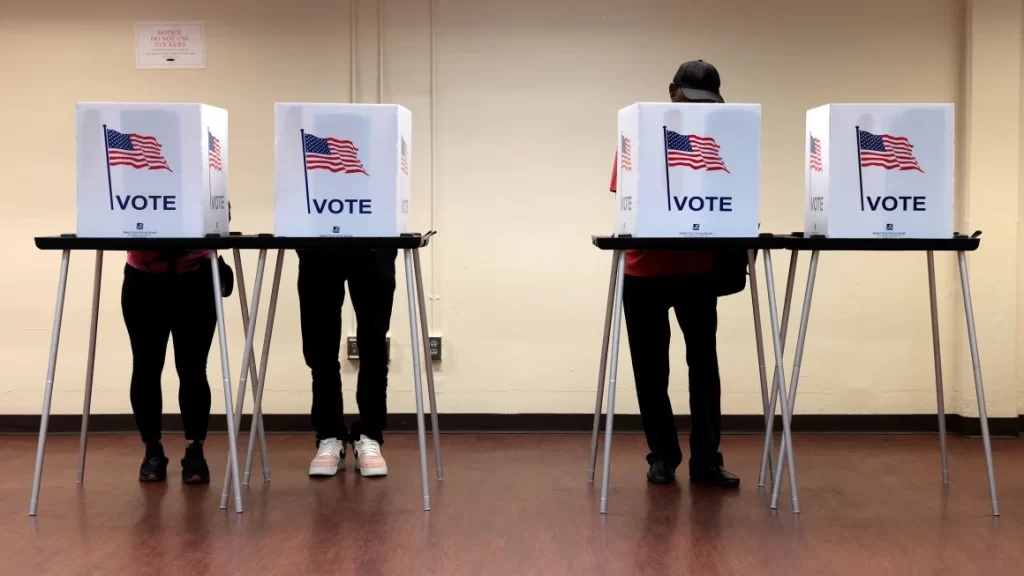In Michigan, a key battleground state for elections, recent isolated incidents have sparked a wave of misleading claims about the electoral process, with some allies of former President Donald Trump seeking to undermine confidence in the voting system. Mistakes, such as an illegal ballot cast and human errors from the secretary of state’s office, have become fodder for conspiracy theorists who suggest widespread fraud is at play.
This week, several events have raised alarm among election officials, as they grapple with the implications of these missteps. Washtenaw County Clerk Lawrence Kestenbaum, a Democrat, expressed concern, stating, “For those of us who run elections, it’s a stressful time anyway, and we really worry about this situation and these kinds of stories spiraling out of control.” He added that the psychological toll of having the electoral process questioned is significant.
Despite the Michigan secretary of state’s office working to maintain transparency and correct misinformation, the incidents have been amplified on social media, leading to unfounded accusations of systemic cheating. The situation highlights how easily small mistakes can be blown out of proportion, especially in an era where misinformation can spread rapidly online.
Amplification of Errors
Although Michigan has seen a smooth start to early voting, confusion arose this week over reported ballot counts due to a formatting error that has since been rectified. A notable contributor to this confusion was a post by Matthew DePerno, a prominent election denier in Michigan. DePerno, a former GOP attorney general candidate, claimed to have found anomalies in the state’s voter database, suggesting that one voter ID had multiple votes recorded at various addresses. His assertions led to a sensational claim of over 160,000 excess ballots cast.
The Michigan secretary of state’s office clarified that the issue was due to a formatting error, not actual voter fraud. They stated, “Each of these voters only had one vote recorded for this election. This error in the data export process has been corrected.” Despite this, DePerno dismissed the official explanation, emphasizing his belief in widespread wrongdoing.
Republican National Committee co-chair Lara Trump acknowledged the error as a “glitch in the system” and confirmed that the duplicates would not be counted, which aligned with the secretary of state’s reassurances. However, DePerno’s persistent denial illustrates the challenge of countering misinformation, as corrections often struggle to reach the same audience as the original claims.
The Scourge of Misinformation
Ben Decker, CEO of the threat intelligence group Memetica, pointed out that the initial claims have a far broader reach than subsequent clarifications. He noted, “The explanation has a lot less reach than the initial claim… it makes it impossible for information to catch up with viral claims.” This reflects a troubling trend where misinformation can quickly overshadow factual clarifications, sowing doubt in the electoral process.
Adding to the narrative of election fraud, Michigan authorities recently charged a 19-year-old Chinese student with voter fraud after he allegedly cast a ballot in the 2024 election. While the case drew attention, experts emphasized that illegal voting by non-citizens is exceedingly rare and often detected promptly. The situation serves as a reminder of the isolated nature of such incidents, which can be manipulated to paint a broader picture of electoral misconduct.
As Michigan’s Secretary of State Jocelyn Benson and local prosecutors noted, investigations nationwide have found no substantial evidence of non-citizens registering or voting. They reiterated their commitment to addressing any illegal voting seriously, even if it is infrequent.
Misunderstandings About Voting Technology
In addition to individual cases of alleged fraud, remarks made by Benson regarding Dominion Voting Systems have stirred controversy. During a recent press conference, she mentioned a “nationwide issue” with Dominion machines affecting disabled voters. Elon Musk amplified her comments on social media, prompting a backlash from Dominion, which disputed the accuracy of her statements. The company claimed there was no widespread issue and that Michigan’s systems were functioning correctly.
Benson later clarified that the concerns were specific to Michigan and not indicative of broader problems. Such misunderstandings about voting technology can further fuel conspiracy theories, especially among those who already believe in election-related misinformation.
Despite these challenges, election officials in Michigan remain resolute. Kestenbaum emphasized their readiness to handle scrutiny and maintain the integrity of the electoral process. “We are accustomed to scrutiny – everyone thinks they are an expert on elections,” he said, asserting confidence in the legal and bipartisan processes in place to uphold the election’s integrity.
As the election draws nearer, the need for vigilance against misinformation becomes increasingly critical. Election officials are determined to ensure that the narrative surrounding the electoral process remains rooted in facts rather than speculation, striving to maintain public confidence in the democratic system.







